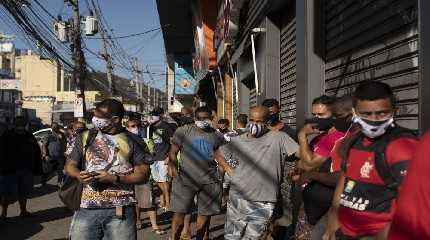
RIO DE JANEIRO, March 3 (NNN-MERCOPRESS) — Rio de Janeiro local authorities are considering the possibility of scrapping the mandatory use of facemasks given the decreasing number of COVID-19 infections reported over the past few weeks.
The City’s Special Committee to Combat COVID-19, known as the City Hall Scientific Committee, is to ponder the issue during its next meeting March 7, City Hall Health Secretary Daniel Soranz told reporters.
Face masks are no longer mandatory in outdoor settings since late October. Other restrictions such as capacity caps were lifted in November, before the arrival of the Omicron variant.
According to Soranz, the Scientific Committee meeting was originally scheduled for March 14, but it was brought forward to March 7 at the request of Mayor Eduardo Paes. “With a more favorable epidemiological panorama, nothing could be more correct than to follow these data with changes in measures,“ Soranz explained.
”Of course, if at some point we see an increase in cases, in hospitalizations, we can come back with a restrictive measure; but it doesn’t look likely,“ he added.
”With a high vaccination coverage, we are seeing other countries also removing these restrictive measures, here in Rio de Janeiro it would be no different,” the health official went on.
Soranz also said authorities needed to agree on a parameter for a booster dose so that the vaccination passport in the city is no longer mandatory. Current coverage in the adult population is 99.1% with the two doses and 53% with the booster, it was reported.
“The expectation is that reaching 70%, 80% of the adult population with a booster dose, we can remove the charge for the vaccination passport in the city of Rio de Janeiro,” Soranz pointed out.
“Even with the intense flow of tourists, the high vaccination coverage held back the increase in the number of serious cases,” the official stressed. “But that protection and that coverage don’t last forever.” Soranz feared the lack of a booster dose could bring back coronavirus variants that no longer circulate in the city.
“We have been insisting a lot on this because it can be a false sense of security to think that we are safe for a much longer period and we are not,” he warned.
Even with the private parties and large-scale gatherings during Carnival, the numbers of the pandemic remain under control and with a downward trend. “We saw many agglomerations during the carnival period, many people getting together. The strategy of limiting the entry of tourists into the city of Rio de Janeiro without a vaccine worked. To stay in the city, you must present your vaccination passport, to go to the main tourist attractions, you must present your vaccination passport, which certainly discouraged the arrival of unvaccinated tourists. We saw that our vaccination coverage contained the epidemiological scenario.”




